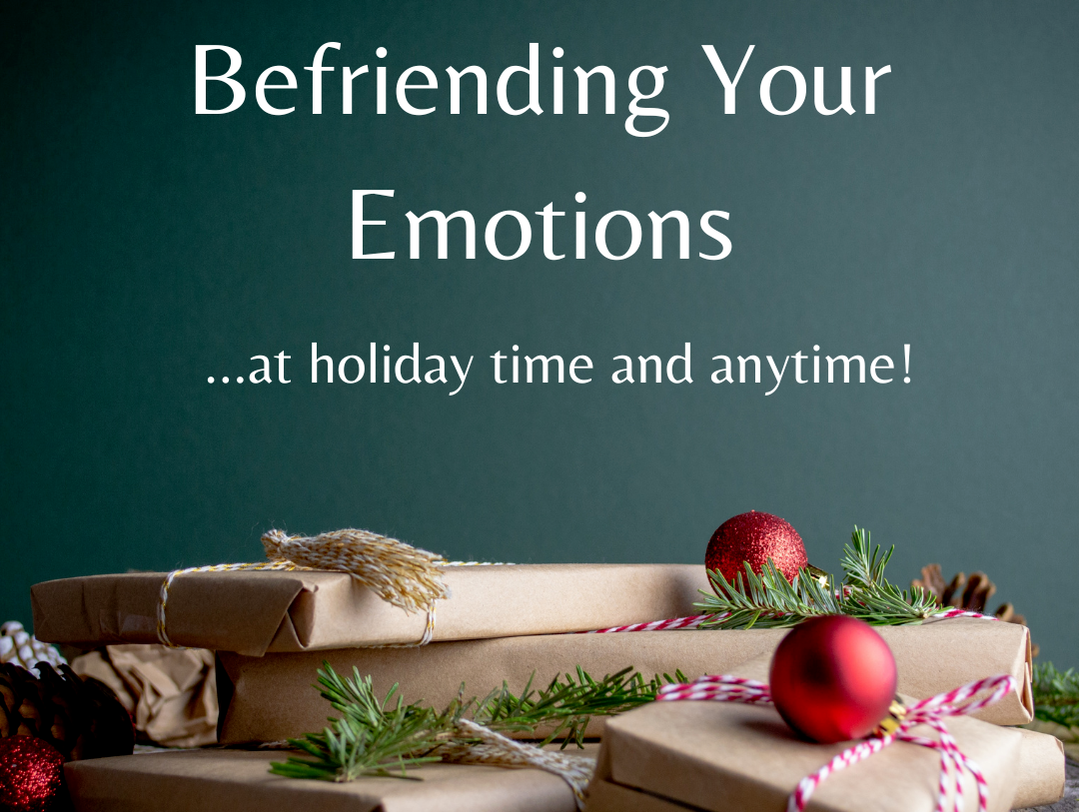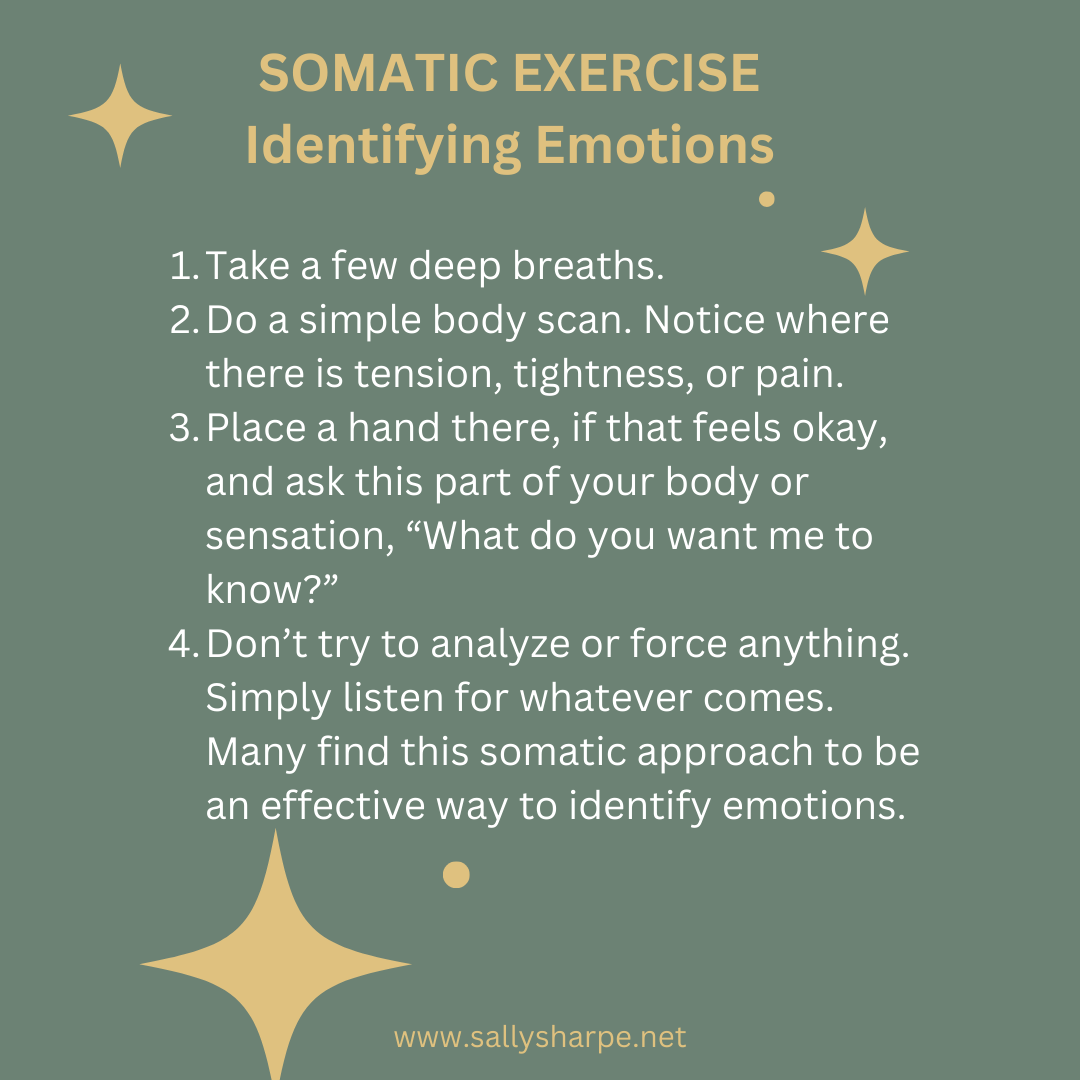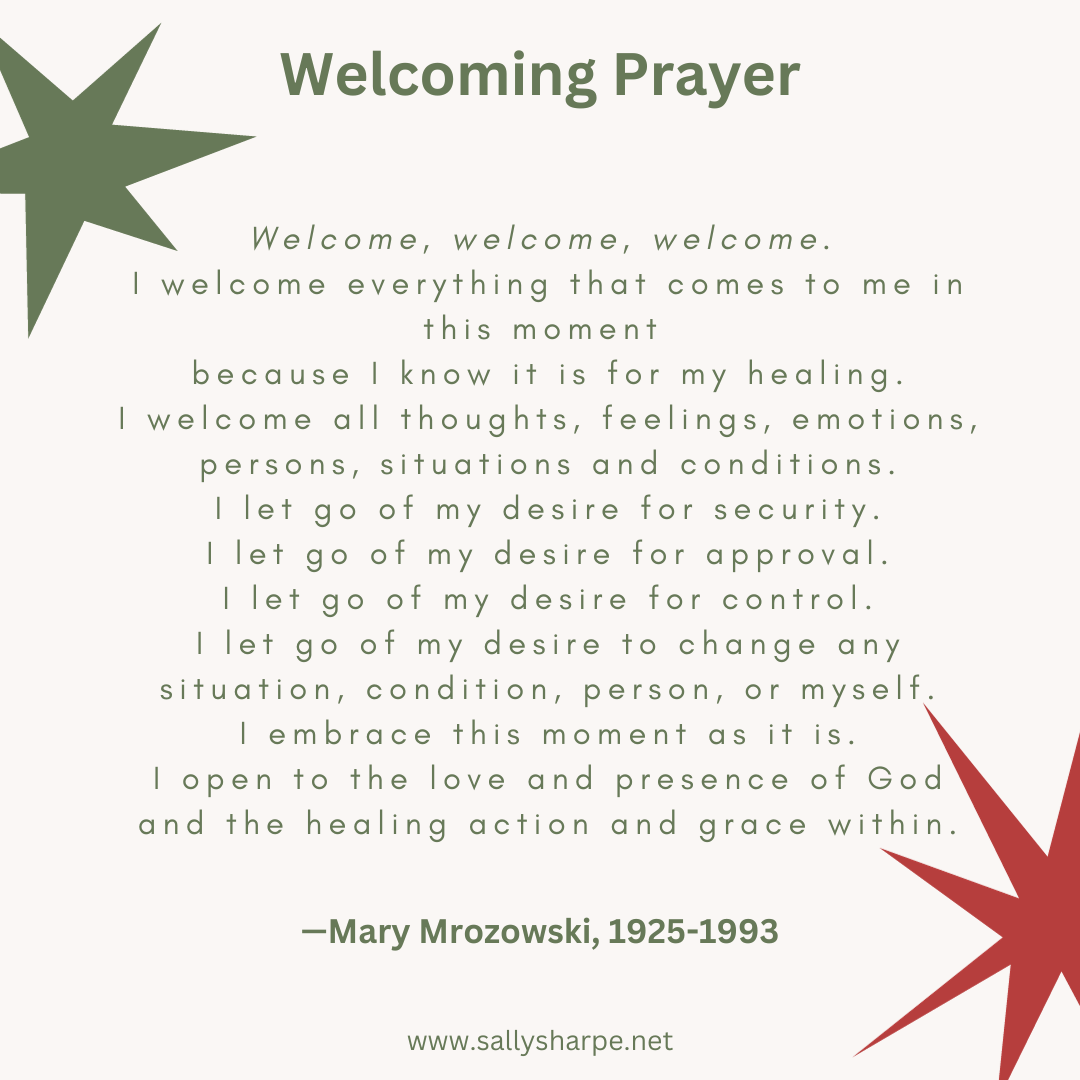|
There are many benefits to expressing our emotions in a healthy way, yet most of us struggle to do it. We explored why in last month's blog. (See October 5, "You Have to Feel It to Heal It.") Add in the stressors and expectations of the holiday season, and it can be challenging to manage our emotions this time of year under the best of circumstances, much less if you are navigating difficult circumstances or loss. But what if managing our emotions is an unhelpful concept? What if, rather than managing our emotions, we could simply befriend them instead? Managing suggests overseeing, supervising, and bearing responsibility for outcomes. It sounds like work! Befriending, on the other hand, suggests acting as a friend, offering help or support. Befriending your emotions is being a compassionate friend to yourself regardless of how you are feeling, offering yourself the same grace and kindness you would extend to a close friend. It's a kinder, gentler approach to healthy emotional expression that enables you to gain understanding about what’s happening within you so you can respond in healthy, beneficial ways. Instead of having one more thing to manage during the holidays—your emotions—allow yourself to feel what you feel and respond to your emotions with gentleness and kindness. That sounds more inviting, doesn't it? And more doable. So, practically speaking, how do we do it? What does it look like to befriend our emotions—at holiday time or anytime? Let’s walk through some basic steps together, keeping in mind that they are not necessarily linear. 1. Normalize your emotions, including painful ones. Despite cultural tendencies to minimize emotions and apologize for emotional expression, having and expressing emotions is not bad or undesirable. It simply means you’re human. This is especially important to keep in mind when it comes to painful emotions. Because our culture encourages us to “get over it” and move on, we must remind ourselves regularly that it’s okay not to be okay—it’s okay to have painful emotions. Having painful emotions is a necessary part of the human experience. Emotions are gifts of God meant to be our teachers or guides as we become aware of our needs and desires so we can make choices that move us toward emotional health. As Chip Dodd expresses in his book The Voice of the Heart, emotions are like lights on the car dashboard—they tell us what’s going on inside us, pointing us to what needs our attention. It can be difficult for us to acknowledge painful emotions at the holidays, especially when we think everyone else is celebrating what is said to be "the most wonderful time of the year." But the truth is that despite any song lyric, painful emotions are common this time of year. According to statistics, levels of anxiety and depression increase—not decrease—during the holidays. Rather than trying to downplay or ignore painful emotions in order to measure up to unrealistic holiday expectations, try normalizing the full spectrum of your emotions instead. Remind yourself that whatever you might be feeling in any moment, you are not alone. Many others are feeling just as you are. As human beings, we feel a variety of emotions on any given day, and that remains true during the holidays. We don't expect ourselves to be happy and joyful 24/7 any other time, so why do we do this to ourselves during the holidays? Let your mantra this holiday season be "It's okay to feel however I feel." It's not only okay, it's the best way to move through your feelings and respond in healthy ways. SOME THINGS TO TRY
2. Become aware of your emotions and name them. Dr. Dan Siegal, professor of psychiatry at the UCLA School of Medicine, has said that when it comes to unpleasant emotions, you have to “name it to tame it.” Science has shown that putting our feelings into words actually reduces the intensity of the emotions. Simply noticing and naming a feeling as it is happening decreases the stress in the brain and body caused by the emotion. When you name your feelings, you "tame" them by acknowledging them, enabling them to soften. Most of us were not taught or encouraged to name our emotions, so it can feel awkward or even challenging for some of us. But with just a little intention, we can learn to do it. The key is to be persistent and patient with ourselves in the process. SOME THINGS TO TRY
3. Welcome your emotions. Often we want to get rid of painful emotions, not welcome them. A common way we try to do this is through positive thinking. Yet despite popular opinion, positive thinking is not an effective way to handle emotions if it keeps us from authentic emotional expression. An emotion must be acknowledged and witnessed in order to be released. Positive thinking without this honest witnessing is more like emotional bypassing. We do a similar thing when we use scriptures or religious platitudes as a way to avoid painful emotions—called spiritual bypassing. Though it may sound counterintuitive, welcoming your emotions helps you move to a place of authenticity, non-judgmental awareness, and acceptance—all of which fosters healing. Though some are reluctant to welcome emotions because they are afraid they will get stuck in those feelings, the opposite is actually true. Welcoming emotions reduces internal conflict and resistance, allowing us to benefit from our emotions and move through them. SOME THINGS TO TRY
4. Allow yourself to feel your emotions. In addition to naming and welcoming your emotions, it's important to allow yourself to truly feel everything that a particular emotional experience might elicit. Sometimes an experience will prompt conflicting emotions, such as a situation that causes you to feel both happy and sad for different reasons. Give yourself permission to honor every emotion. Every feeling is valid and requires expression if you are to move through it. Feeling our emotions moves us to a place of integration and healing rather than disintegration and internal chaos. Because most of us are unable to plumb the depths of our emotions in the moment, we must be patient and give ourselves space, over time, to sit with our emotions as we're able. Depending on the emotion or experience, it might take days, weeks, months, or perhaps even years to give full expression to our feelings. When it comes to feeling our emotions, slower is faster. Rather than speeding through the process, give yourself permission to feel your feelings in manageable increments over time—for as long as it takes. Rather than predetermining the ending date for the process, trust that it will take as long as it takes, and that God will guide you. During the holidays, this means giving yourself permission to choose the activities you're able to participate in and those you are not. It means allowing yourself time and space to feel your feelings. And it means letting go of expectations and outcomes, which can inhibit our true feelings. SOME THINGS TO TRY
5. Get curious about your emotions and listen to them. Your emotions are messengers bringing information essential to your healing and wholeness. All emotions, particularly those you would rather avoid, are here to tell you about your hurts, wounds, needs, and desires. They are guides leading you to parts of yourself that need healing. Instead of being critical or judging your emotions, move to curiosity. Listen to them as you would to a good friend, and learn what they need you to know. Only then will you be able to respond in a compassionate and beneficial way. One of the reasons we resist our emotions is we're afraid they will take us over and overwhelm us. Often the opposite is true. When we stop trying to suppress, numb, or control our emotions and allow them to have a voice, they tend to soften. The parts of our soul that are holding emotion want to be heard, and when we are willing to listen, often it is no longer necessary for them to be loud or unreasonable. SOME THINGS TO TRY
6. Offer yourself self-compassion and understanding. Once you have listened to your emotions with curiosity and compassion, you're better prepared to offer yourself self-compassion and understanding. For most of us, self-criticism comes much more easily than self-compassion. We tend to beat ourselves up for faults, both big and small. But according to psychologist Kristin Neff, self-criticism comes at a price, making us anxious, dissatisfied with life, and even depressed.* The key to offering yourself self-compassion and understanding is treating yourself with the same kindness and caring support that you would show to someone you care about. Doing this regularly leads to genuine care for your own well-being, producing deep emotional benefits. SOME THINGS TO TRY
7. Allow your emotions to be witnessed by God and others. Witnessing is an invaluable step when it comes to processing our emotions and moving toward healing. God designed us for relationship, and we find healing as we allow God and safe people (those who will not judge us or try to fix us) to witness our pain with love and compassion. As someone who has tended to push down grief all my life, this is something I'm stepping into more intentionally myself. Though my father passed away almost four years ago, recently I sensed God inviting me to allow my unprocessed grief to be witnessed in community by attending a grief group at my church. On the week when we shared our stories, I was amazed by the depth of emotion that surfaced as I shared the account of my father's death despite the passage of time. I experienced how valuable it is for grief to be witnessed, validated, and comforted even after the passing of time. When there are unprocessed emotions, there is a need for them to be witnessed. Depending on your life experiences, you may find it easier to share with others before you're ready to be completely real with God about how you're feeling, even if you know that God knows already. If wounds have affected your image of God or your ability to trust God, you may find it helpful to share with a trusted person before baring your soul to God in prayer. Or you may find it easier to be vulnerable and authentic about your emotions with God first, which helps prepare you to share later with others. As others see us, hear us, and are with us in our pain, they serve as conduits of the loving presence of God, creating healing experiences. SOME THINGS TO TRY
My prayer for you is that learning to befriend your emotions will help you to love yourself well, deepen your relationship with God, and experience greater healing and joy—in every season. Recommended Resources: (Click links below to read book descriptions) The Voice of the Heart, Chip Dodd Emotionally Healthy Spirituality, Peter Scazzero No More Faking Fine, Esther Fleece The Body Keeps the Score, Bessel van der Kolk Permission to Feel, Marc Brackett *"The Power of Self-Compassion," Jason Marsh, Greater Good Magazine, March 14, 2012.
0 Comments
|
Hi, I'm Sally!
I'm passionate about connecting with God and connecting with people, offering spiritual encouragement and companionship. I'm so grateful to be on the journey with you as we walk with God together. subscribeArchives
July 2024
Categories
All
|
|
Copyright 2019 Sally Sharpe Spiritual Direction |
Proudly powered by Weebly
|




 RSS Feed
RSS Feed
